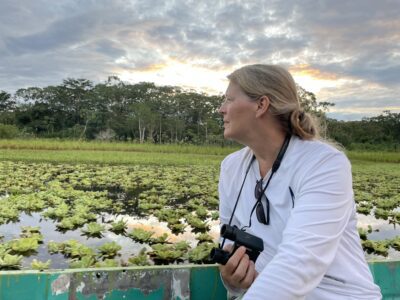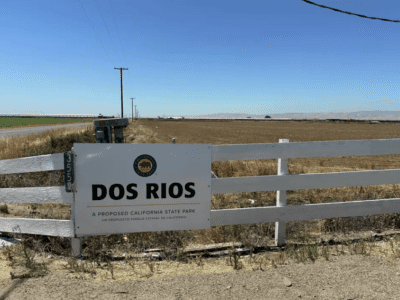Growing a Resilient Water Future
Reviving riverways helps California’s environment and communities thrive with less in a drier future
California’s dry years are getting drier.
The state’s eight warmest years occurred within the last 10 years. A warming climate magnifies a suite of pressing problems felt across the state.
Among these is the increased frequency and intensity of droughts and diminished water supplies for communities and the environment due to a changing climate.
The chronic lack of sufficient water takes a toll on households, industries, and the world’s fourth-largest economy. It also threatens the long-term survival of a growing number of species, including iconic wildlife like salmon which face the dual threat of shrunken waterways and lethal water temperatures.
According to experts, 80% of native freshwater fish in California in decline and nearly 50% of salmon and steelhead runs face extinction by 2,100.
Local and state governments continue to advance solutions for increasing California’s water supplies. Many of these, however, rely on often expensive and slow infrastructure improvements to our existing, highly engineered water supply system.
What if California could grow its water resiliency naturally and in a way that offers other important benefits to the environment and people? We can, and the answer lies in giving new life to riverways and floodplains, 95% of which have been lost over the last 150 years, and growing a thriving future with less water.
THE PROBLEM
- California’s current drought is the worst in state history
- Groundwater supplies in the Central Valley are at their lowest levels ever
- Populations of imperiled wildlife such as salmon have dropped to historic lows due in part to lack of water in rivers
- California’s farming economy lost $1.7 billion in 2022, including 12,000 farm-related jobs due to drought
OUR SOLUTION
- Millions of acre-feet of water can be conserved and replenished for the environment and communities by reviving riverways
- Over the last 25 years, River Partners restoration efforts have conserved 10+ trillion gallons of fresh water statewide
- Expanding and restoring floodplains across the Central Valley could recharge tens of thousands of acre-feet of groundwater by giving rivers more room and letting floodwaters sink in

A Dual Approach to Water Abundance
Restoring California’s riverways is a multi-benefit solution to mitigating droughts and a key strategy in boosting the state’s long-term water resiliency.
Less Is More
River Partner’s efforts to restore riverways with low-water, drought-tolerant native trees and vegetation conserves thousands of acre-feet of fresh water each year, freeing up more to benefit healthy ecosystems and communities. After a three-year establishment period on all our restoration projects, we cease irrigation entirely. After that, the only water newly planted native landscapes receive is that which occurs naturally.
Since our founding in 1998, we’ve conserved over 10 trillion gallons of water on nearly 20,000 floodplain acres we’ve given new life to. Transforming riverside acres into native habitat and forests throughout the Central Valley over the coming decades could save 50,000-100,000 acre-feet of water annually. That’s enough to raise Lake Shasta by over 3 feet.
To boost ecosystem health, River Partners is petitioning the California State Water Resources Control Board to allow the voluntary dedication of water by Central Valley landowners to rivers to boost populations of salmon and other imperiled wildlife. Under the petition, water voluntarily dedicated to rivers would be protected from diversion downstream and eventually flow unimpeded through the San Francisco Bay to the Pacific Ocean to benefit fish, ecosystems, and communities.
Latest Water Conservation News
California’s Newest State Park is Like a Time Machine
Educator Virginia Matzek on Natural Carbon Capture and Floodplain Restoration
Filling the Reservoir under Our Feet

Groundwater has been called one of California’s most important drought defenses, and restoring riverways plays a big role in boosting supplies.
Each year, 2 million acre-feet more water in the San Joaquin Valley alone is pumped out of the ground than is naturally replenished. That’s enough to supply 1 million California homes for a year—roughly the population of San Jose. Groundwater is the lifeblood of the Central Valley, known as the food basket to the world and which faces a 2040 deadline to bring groundwater supplies into balance.
Restored riverways and floodplains allow floodwater to move across the landscape, slow down, and soak in to replenish groundwater reserves for use in dry times by households, farms, businesses, and communities. By allowing floodwater to slow down and soak in, these same floodplains greatly enhance flood protection for downstream communities.
Additionally, 500,000 to 1 million acres of farmland in the San Joaquin Valley will be converted to other uses by 2040 under the Sustainable Groundwater Management Act passed in 2014. River Partners hopes to restore much of this land to maximize water conservation and boost groundwater supplies while growing much-needed wildlife habitat, lowering flood risk for downstream communities, and boosting local economies through good-paying green jobs.
Statewide, restored floodplains could replenish hundreds of thousands of acre-feet of groundwater each year and help get the state through the increasingly dry times ahead.




